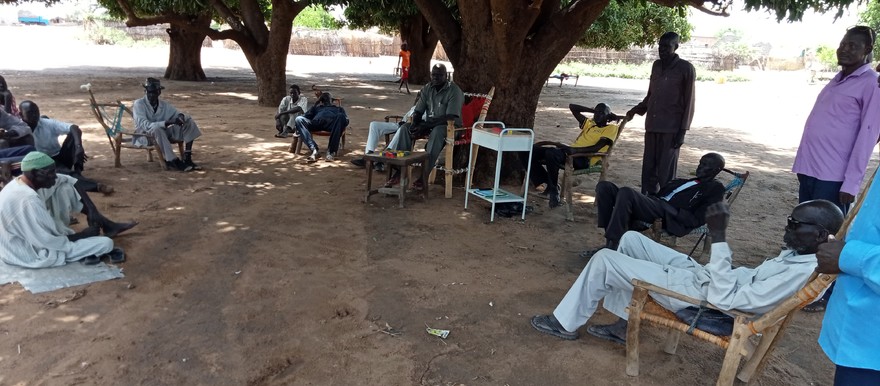Paramount chiefs across Northern Bahr el Ghazal State have complained that the judiciary has hijacked their roles to generate money from cases meant to be handled by chiefs.
The chiefs asked the government to reinstate their powers so that they can handle cases within local communities.
Bride price and dowry-related cases, adultery, family disputes, weddings, and divorces are among the matters chiefs are routinely called upon to deal with. The judges, according to the chiefs, have taken control of the simple duties purposely to generate money from the cases.
According to the chiefs, their arbitration role helps in the mitigation of conflicts within local communities and expediting justice.
For the last couple of months, Radio Tamazuj carried out interviews with the traditional authorities and they expressed their grievances, saying that Aweil Central Prison is overcrowded with detainees as the high court failed to deal with the backlog of minor cases.
Lual Lual Bak, a chief in Deng Nhial area in Northern Bahr el Ghazal State said they ruled on an incest case in 2020 a fined the culprit to pay a fine of a cow only for the matter to be taken over by the judiciary.
“There was one case we (chiefs) handled of somebody who committed a crime by impregnating his relative’s daughter which is not allowed in Dinka customs. We had already sentenced the boy to pay one cow but his mother went to the judiciary and renewed the case last year (2020) and there are so many cases happening because the citizens are not considering the roles of the chiefs,’’ said Bak.
Bak blamed the high court for not referring the case back to them.
Ken Barjok, a paramount chief in the former Lol State, said that there was a case where a man was accused of committing adultery with someone else’s wife and that the case which was brought to a local court in Nyamlel was later taken to the high court without a final verdict from the chiefs.
“There are a lot of adultery cases going to the judiciary but yet the adultery cases should be addressed by the chiefs. I witnessed by myself that the judiciary hijacked an adultery case which was being handled by the chiefs in Nyamlel,” Barjok said. “The simple issue was complicated until advocates were involved. The chiefs currently don’t have any functions because the high judiciary controls their duties.’’
Ayom Wek Akol, the paramount chief of greater Paliet in Aweil South County, also fingered the judiciary for taking over cases that are supposed to be tried by the local chiefs because of monetary gain. Wek alleged that judges extorted money to handle cases.
“Yes, the judges in South Sudan are only serious in gathering money because they don’t refer some cases to the chiefs to handle. If a complainant opens a case and needs his cows to be paid back by an accused, the judges charge 3,000 SSP per cow. This one brings a lot of money and that is why they control cases which are not in their jurisdiction,’’ Wek alleged.
He however qualified that certain cases such as surveyed land must not be handled by the chiefs but judges.
“The problems in surveyed residential areas are tried by the judges and not us,’’ Wek admitted.
Another paramount chief, Abaker Talatin Dichak, in Aweil Center County said, they (chiefs) are just passing time under trees because their work has been taken over by the judges. He blamed the government for ordering the chiefs to pay taxes and bulls while they don’t have income or even salaries from the government.
Talatin said, “We are not handling any cases, we are just chatting here under the trees because we don’t have anything to do. We are telling the government that you have frustrated us and yet if there is a function, the government asks the chiefs to contribute bulls and many other things. Another thing, we have been working for 11 years without salaries and have no power to resolve any cases now.”
Deng Majak Deng, the director for Northern Bahr-el-Ghazal State legal administration said the chiefs’ rights are protected in South Sudan Constitution and the local government act, saying that the chiefs are free to carry out their duties without interference from other bodies.
“Of course, according to the South Sudan Constitution, chapter five says customary laws are sources of the country’s constitution and the Local Government Act also gave the chiefs powers to handle traditional and related matters,” Majak explained. “This is their duty and no one is to intervene. Even the judiciary sometimes refers to some traditional cases to the chiefs. No one prohibited them from running their duties, even sometimes death cases are tried by the chiefs.”
Tereza Achol Bilwan, a civil society activist in Northern Bahr el Ghazal State underscored the role of chiefs in the communities.
“Their duties are not supposed to be taken away from them because if there is a problem, it should first be reported to the chiefs. For instance, if you go to a court you will be asked where you live and then you should be told to go back to your area chief. If the judges are controlling all cases, what will the chiefs do?” Achol asked.
Kuol Maduok, a lawyer practicing in the state, said the chiefs are not marginalized and that they work in collaboration with the judiciary, and courts at the grassroots operate freely.
“No, no. I don’t think what the chiefs say is right. The judiciary gives chiefs some cases to try and they are working in their jurisdictions. They are working now and if you visit them, you will get them busy at their courts and that means they are working,’’ Lawyer Maduok said.




